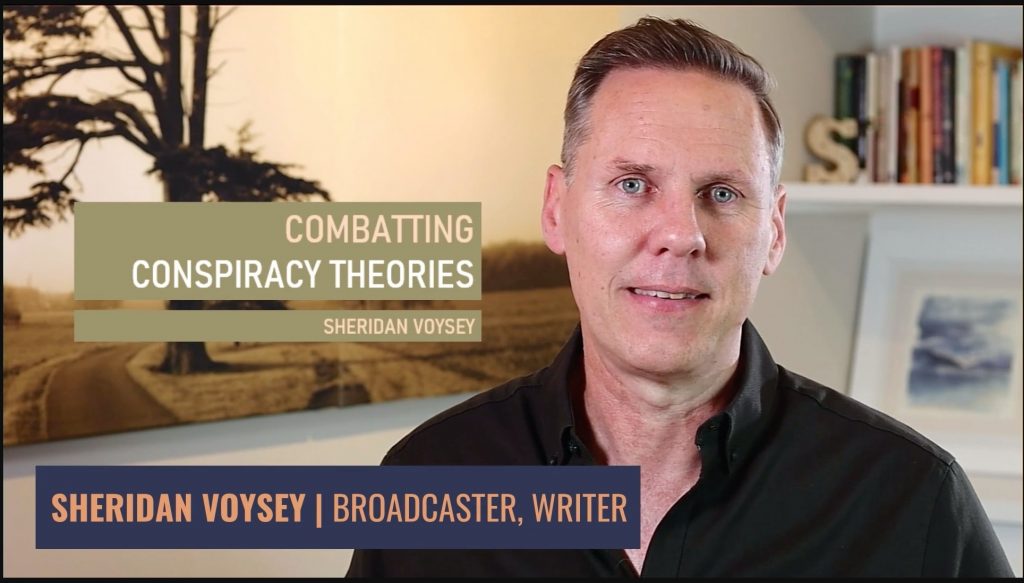By: Sheridan Voysey
From QAnon to Flat Earth to Covid-19 ‘Plandemics’, conspiracy theories of all kinds are proliferating right now, dividing families and communities, and putting the health of many at risk. It’s imperative that we learn to detect and avoid them. In this video I outline in detail four ways how to do that.
This keynote session was recorded for Christian Media and Arts Australia’s CONNECT21 conference in August 2021. While it’s aimed at broadcasters and media leaders, CMAA has released it for free as a community service as the principles explored are transferable to us all. While the ideas should hold true over time, please note the context. The session addresses matters as they were in August 2021. I also intentionally avoid issues like vaccine mandates and other contentious political decisions which we can have necessary debate and disagreement over. The topic is conspiracy theories: false narratives that are fraying our societies and families.
Weeks of research went into this session. It’s now being used as training curriculum for media professionals and I hope it helps you too. Grab your notebook and let’s begin.
Watch Now: Combatting Conspiracy Theories
1. Recognise Conspiracy Theories
A conspiracy theory is “an attempt to explain events as the secretive plots of powerful people.” They thrive in times of crisis and uncertainty, are adopted by people who feel disempowered and under threat, and offer a false sense of control by giving simple explanations to confusing events.
The Seven Traits
In The Conspiracy Theory Handbook Stephan Lewandowsky and John Cook note seven traits common to all conspiracy theories (making the acrostic conspir). You can help spot a conspiracy theory by recognising these traits and realising we are most vulnerable to conspiracy theories during times of fear and stress.
Contradictory beliefs
Believers will willingly hold contradictory claims
Overriding suspicion of the official account
Which leads to a rejection of anything that doesn’t fit with the theory
Nefarious intent
A belief that conspirators are out to do us harm
Something must be wrong
On the rare occasion a belief is jettisoned, there’s still suspicion of official accounts
Persecuted victims
Believers see themselves as persecuted fighters for truth and freedom
Immune to evidence
In the end, logic and facts don’t sway true conspiracy theory believers
Reinterpreting randomness
Since ‘nothing happens by chance’, random details get interpreted as proof of the conspiracy theory
2. Seek “Verifiable Facts from Credible Sources”
This is the mantra we are to live by and pass to others, helping our friends, family and colleagues sift fake news from the true. Five questions can help us discern credible sources:
Is the media outlet reliable?
Fake news sites abound. How old is the site? Are journalists listed and contactable? The Ad Fontes Media Bias Chart assesses (mainly US) outlets for reliability also
Does the source have specific expertise and proximity?
Not all ‘doctors’ are qualified to talk about Covid vaccines, not all researchers are close to this story. Likewise, we avoid the myth of omnicompetence ourselves
Can the claim be verified by others closely involved?
Eg. are medical claims verified in peer-reviewed journals?
Is the source accountable?
Public health officials are, YouTubers are not
Is there another motive at play?
Whether political, ideological, personal or profit-based? Is the source attempting to be balanced or only presenting pre-decided conclusions?
3. Counter Fear With Truth and Practical Guidance
People are more vulnerable to conspiracy theories when they feel under attack. When Christian leaders and bloggers instil fear over loss of freedoms, loss of religious liberties and the like, they can unwittingly set their audience up for conspiracy theories. Fear without agency backfires. When we present people with a problem that is likely to instil fear, provide steps on what they can do in response—empowering them with agency.
4. Model Civility at all Times
The ‘age of outrage’ is replacing community with tribalism, including tribes based around conspiracy theories. Instead of anger, we will model civility. We will not demean others with name-calling or ridicule. We will remember that “A gentle answer turns away wrath” (Proverbs 15:1). Even when firmly opposing the lies of a conspiracy theory, we act out of love for the person involved.
Article supplied with thanks to Sheridan Voysey.
About the Author: About the Author: Sheridan Voysey is an author and broadcaster on faith and spirituality. His latest book is called Reflect with Sheridan. Download his FREE inspirational printable The Creed here.
Feature image: Photo by Ehimetalor Akhere Unuabona on Unsplash

